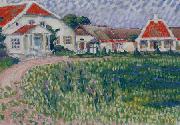Großhandels China Öl Gemälde & Rahmt Ein |
|||||||||||

|
|||||||||||
|
|
|
||||||||||||||
|
konrad magi
konrad magi(1878 to 1925),was an Estonian landscape painter. He was one of the most colour-sensitive Estonian painters of the first decades of the 20th century, and Magi works on motives of the island of Saaremaa are the first modern Estonian nature paintings. Magi received his elementary art education from the drawing courses of the German Artisans Society of Tartu (1899?C1902.) At the same time, he was keenly engaged in theater, violin, and various sports. Magi continued his art education as an unattached student in Saint Petersburg (1903?C1905.) In the autumn of 1907, he went to Paris. There Magi studied at a free academy. From 1908 to 1910, he lived in Norway. In 1912, Magi returned to Tartu, where he worked as an art teacher. In Åland, he created delicate plant vignettes in the style of Art Nouveau: Kahekesi (Two together; 1908; China ink drawing). In Paris, Magi was influenced by Impressionism and Fauvism, which had a significant impact on his colours: Lilleline vali majakesega (A flower field with a little house; 1908?C1909), Norra maastik manniga (A Norwegian landscape with a pine; 1910). From 1918, the influence of Expressionism is manifest, fostered by Mägi extreme sensitivity and emotional response to the anxious times: Puhajarv (Lake Puha, ', ', ', ', ', ', ', '); 1918?C1920), Otepaa maastik (Landscape of Otepaa; 1918?C1920). Also influenced by Expressionism are his big figure compositions Piet?? (1919), Kolgata (Golgatha; 1921). Konrad Magi - Rannamaastik (Beach landscape)Magi new artistic period, begun on a trip to Italy, brought calmer tempers: Varemed Capril (Ruins in Capri; 1922?C1923). Along with nature pictures, he painted flowers and portraits. Magi mostly beautiful female models express the Art Nouveau ideal of beauty: Holsti (1916). In his later portraits from the 1920s, a more serious temper is expressed: Madonna (1923?C1924). |
||||||||||||||
|
|
||||||||||||||
|
||||||||||||||
|
|
||||||||||||||
| konrad magi
konrad magi(1878 to 1925),was an Estonian landscape painter. He was one of the most colour-sensitive Estonian painters of the first decades of the 20th century, and Magi works on motives of the island of Saaremaa are the first modern Estonian nature paintings. Magi received his elementary art education from the drawing courses of the German Artisans Society of Tartu (1899?C1902.) At the same time, he was keenly engaged in theater, violin, and various sports. Magi continued his art education as an unattached student in Saint Petersburg (1903?C1905.) In the autumn of 1907, he went to Paris. There Magi studied at a free academy. From 1908 to 1910, he lived in Norway. In 1912, Magi returned to Tartu, where he worked as an art teacher. In Åland, he created delicate plant vignettes in the style of Art Nouveau: Kahekesi (Two together; 1908; China ink drawing). In Paris, Magi was influenced by Impressionism and Fauvism, which had a significant impact on his colours: Lilleline vali majakesega (A flower field with a little house; 1908?C1909), Norra maastik manniga (A Norwegian landscape with a pine; 1910). From 1918, the influence of Expressionism is manifest, fostered by Mägi extreme sensitivity and emotional response to the anxious times: Puhajarv (Lake Puha, ', ', ', ', ', ', ', '); 1918?C1920), Otepaa maastik (Landscape of Otepaa; 1918?C1920). Also influenced by Expressionism are his big figure compositions Piet?? (1919), Kolgata (Golgatha; 1921). Konrad Magi - Rannamaastik (Beach landscape)Magi new artistic period, begun on a trip to Italy, brought calmer tempers: Varemed Capril (Ruins in Capri; 1922?C1923). Along with nature pictures, he painted flowers and portraits. Magi mostly beautiful female models express the Art Nouveau ideal of beauty: Holsti (1916). In his later portraits from the 1920s, a more serious temper is expressed: Madonna (1923?C1924). ca 1910 Õli, lõuend. 43,5 x 61,5. cyf |
||||||||||||||
|
Related Paintings to konrad magi :. |
||||||||||||||
|
|
||||||||||||||
|
|
||||||||||||||
|
KONTAKTIEREN Sie UNS |







